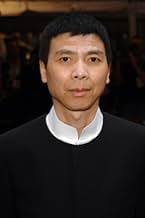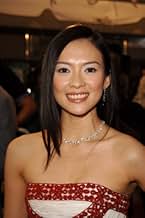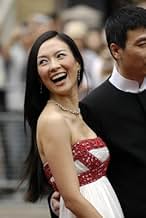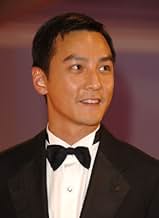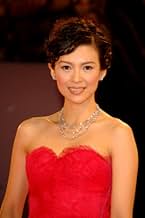VALUTAZIONE IMDb
6,4/10
7301
LA TUA VALUTAZIONE
L'imperatore, l'imperatrice, il principe ereditario, il ministro e il generale hanno tutti i loro nemici che vorrebbero uccidere in un banchetto notturno.L'imperatore, l'imperatrice, il principe ereditario, il ministro e il generale hanno tutti i loro nemici che vorrebbero uccidere in un banchetto notturno.L'imperatore, l'imperatrice, il principe ereditario, il ministro e il generale hanno tutti i loro nemici che vorrebbero uccidere in un banchetto notturno.
- Regia
- Sceneggiatura
- Star
- Premi
- 10 vittorie e 25 candidature totali
Yanbin Liu
- Messenger
- (as Liu Yanbin)
Recensioni in evidenza
The cinematography of this movie is wonderful, and anyone willing to sit through a movie of any stripe to see a fresh sword fight on a gorgeous mountainside should see this movie. I particularly liked the way that fighting scenes in the movie were sometimes juxtaposed next to musical performances complete with beautiful, slow movements by dancers. I think the comparison heightened my sense of the ballet-like quality of the otherwise violent confrontations. Those lead to consider seeing this movie on suggestions that it presents an artful re-imagination of Shakespeare's Hamlet--the one I read was in the Beijing Daily--should look elsewhere, however. This movie is a study in how a complex and interesting character study of one of the most enigmatic characters in the history of drama could be rendered both cliché and senseless.
I'm a big fan of Chinese movies, Ziyi Zhang and Shakespeare, so I was definitely looking forward to this movie. The story is inspired by Shakespeare's Hamlet and does an excellent job of translating the classic to an historic setting at the end of the Tang dynasty. I especially enjoyed the reinterpretation of Hamlet's mother as Prince Wu Luan's former lover (there was always something uncomfortably incestuous in Shakespeare's original). The acting is superb with kudos to both Ziyi Zhang and You Ge for creating a pair of very complex characters as Empress and Emperor. Some of the dialog is poetic in spite of not being Shakespearean. The sets were sumptuous. And Qing Nu's song at the end was beautiful!
So where did it go wrong? Except for Qing's song, the rest of the music was annoyingly obtrusive. Most of the action scenes were stylized and shot in slow motion. And many times the annoying music was playing during the slow motion action sequences, which effectively doubled the annoyance. Only the Prince's "audition" was a meaningful, well constructed action sequence. Finally, it could have been edited better with the movie reduced by about 15 minutes. There were several scenes that just didn't make sense. For example, there is a beautiful shot of Empress Wan entering the water naked, but it has no relation to what came before or after (ok, maybe that scene doesn't need context, but it just seemed out of place).
Overall, a decent movie with flashes of brilliance but having one too many flaws to rank any higher.
So where did it go wrong? Except for Qing's song, the rest of the music was annoyingly obtrusive. Most of the action scenes were stylized and shot in slow motion. And many times the annoying music was playing during the slow motion action sequences, which effectively doubled the annoyance. Only the Prince's "audition" was a meaningful, well constructed action sequence. Finally, it could have been edited better with the movie reduced by about 15 minutes. There were several scenes that just didn't make sense. For example, there is a beautiful shot of Empress Wan entering the water naked, but it has no relation to what came before or after (ok, maybe that scene doesn't need context, but it just seemed out of place).
Overall, a decent movie with flashes of brilliance but having one too many flaws to rank any higher.
this film is beautiful to look at. Scenery is great, the way the scenes are set up, the colours and the lighting are fantastic. Even the actors are beautiful to look at - Zhang Zhi Yi is at her sensual best.
The story did have some interesting twists but not too many which is why some on here are complaining it's not 'complex' or 'layered' enough. But compared to a regular Hollywood film and this one is much better.
The acting is uneven. Daniel Wu had a tough time adding any depth to his morose character. I guess he's the Chinese version of Hayden Christenson. Zhang Zhi Yi really shines as does Zhou Xun. Ge You also plays the usurping emperor with passion and adds a bit of humanity to him - he's not just an evil bad guy to be hated.
8/10
The story did have some interesting twists but not too many which is why some on here are complaining it's not 'complex' or 'layered' enough. But compared to a regular Hollywood film and this one is much better.
The acting is uneven. Daniel Wu had a tough time adding any depth to his morose character. I guess he's the Chinese version of Hayden Christenson. Zhang Zhi Yi really shines as does Zhou Xun. Ge You also plays the usurping emperor with passion and adds a bit of humanity to him - he's not just an evil bad guy to be hated.
8/10
Definitely worth catching on the BIG screen, this is an epic about court intrigue in the Five Dynasties period, which follows in part the Hamlet setup of a murderous uncle usurper (You Ge) and his duplicitous queen (Zhang Ziyi), with an angry yet distant, brooding prince (Daniel Wu). The details and setting are different enough so that the new story carries its own weight and is interesting, however. The acting is strong (some excellent), the martial arts scenes memorable, and the sets are fantastic! This is not a fully realistic historical drama, by the way. Director Xiaogang Feng has crafted a modern art piece here, highly stylized in some parts, and often gory, especially the martial arts scenes, so if you can't stomach people flying and leaping like phoenixes (while disemboweling each other), skip it. The highly artistic feel of the film is kept somewhat in check by the gritty, used, and sometimes decaying feel of the palace, and more so by the tight, sparse dialog, the drama and the tension of the story. (Although following in the footsteps of highly stylized films like some of Zhang Yimou's, the focus returns very firmly to the story in this one, thankfully.) Similarly, the stunning beauty of parts of the film is balanced by the unmitigated ambition of the characters and their other dark flaws. These left the story with no single, simplified protagonist to cheer for the very opposite of Hollywood formula. (The supporting role played by Xun Zhou might be an exception, but she's the very image of innocence and purity to a fatal flaw, and you pity her more than rooting for her.) The raw ambition, incestuous lust, jealous hate, betrayal and/or impotence darken nearly every character. While refreshingly different in this sense, it almost left me reaching for my goblet of hemlock. The Chinese title Ye Yan should have been translated as The Night Banquet rather than The Banquet (its English billing where I am), as the climax occurs at a midnight banquet unwisely set by the emperor at an inauspicious time, and it would have better reflected the darkness of the film.
Overall, I give it a big thumbs up.
Overall, I give it a big thumbs up.
It's an oriental kung fu Hamlet.
Everyone's been saying it's loosely based on Shakespeare's tragedy, and to some, the movie's indeed a tragedy with its slowness in pace and lack of action, but I'd like to see it as because of its heavy reference to Hamlet (the poisoned quill, and many other plot points and scenes), it sort of created a crutch on which to lean the movie upon, hence the familiarity to some, therefore having the source serving as a double edged sword - the movie beholden to it and eventually ending it on a weak note.
Having inherited the creative team of Yuen Wo Ping (action choreography), Tan Dun (Music), Tim Yip (Art Direction), and the starlet in Ziyi Zhang (wonder why the westernized juxtaposition of her name) does not automatically replicate the success of Crouching Tiger Hidden Dragon that easily. It's the X-factor and the blending of elements of novelty in CTHD that made it a huge success, and blindly following the predetermined formula is akin to hammering a square peg into a round hole.
While the art direction is lush and everything looking adequately regal, somehow Tan Dun's music seemed to be muted throughout the movie, only exhibiting sporadic brilliance to drum up scenes with the soundtrack, or the hauntingly beautiful theme song. The major disappointment however, will be in the fighting scenes. Here, martial arts both function as a contrast to the much muted artsy style of the Hamlet here, Prince Wu Luan (Daniel Wu), highlighting the difference in power between the pen and the sword, as well as functioning as foreplay. I thought with the gratuitous fake blood spewing across the screen, it was kind of a homage to 70s Shaw Bros martial arts classics, and a nod to director Chang Cheh, the king of ketchup blood. The initial big sequenced battle scene might have whet appetites, but sadly subsequent battles do not match up, with its repetitive running up walls or in mid air, as if Yuen had run out of tricks in the wire-work manual, having at one point seemed to copy Tsui Hark's Dao (1995). There's one moment of innovation though in a scene of punishment not seen (at least to me) before.
But not that I'm complaining. If this martial arts in this movie is viewed without comparisons to other more recent fantasy martial arts movies like Hero and House of Flying Daggers, it is still enjoyable and beautifully choreographed, and surpasses The Promise by a huge mile. Just that it lacked a fresh look in battles, and the unimaginative costuming of the Imperial Guards didn't help, looking too close like distant cousins of Lord of the Ring's Nazguls / Ringwraiths / Black Riders.
Desire as a theme runs through the movie very strongly, the desire for love, endless power and pure, unadulterated revenge. Very briefly, the story by now will be fairly obvious with Emperor Li (Ge You) usurping the throne from his brother, and coverts his wife Empress Wan as his own, who at one point in time was Prince Wu Luan's old flame. The Prince here is a fellow in love with the arts and bent on avenging his father, and who is the subject of unrequited love by the daughter of a minister - Qing Nu (Zhou Xun).
It's all about the wearing of masks and the building of facades, of hiding true intentions to achieve personal objectives. The contrast between the two men in the Emperor and the Prince is looked into, their love lives examined - one who uses power to obtain love, while the other's fortune to be loved brought him unimaginable influence.
Despite its references to Hamlet, the focus of the movie here seemed to be Ziyi Zhang's Empress Wan, as she plots and schemes, leaving you perplexed as to whether to sympathize and pity her, or applaud her attempts at exacting her own brand of justice. Acting all round is nothing to rave about, and though Ge You's performance seemed the better of the lot, his measured, subtle ways as the Emperor comes off rather weakly as a man capable of scheming to get to where he is. Somehow, I thought that Hamlet allowed the acting to take a foot off the pedal as audiences would already put in place perceptions and direct translations of character for character.
All said, The Banquet is still a reasonably competent foray into the martial arts genre for director Feng Xiaogang, and if he were to put another movie from the genre out, I'll sure be there to watch it. Now to anticipate Zhang Yimou's next contribution to the genre.
Everyone's been saying it's loosely based on Shakespeare's tragedy, and to some, the movie's indeed a tragedy with its slowness in pace and lack of action, but I'd like to see it as because of its heavy reference to Hamlet (the poisoned quill, and many other plot points and scenes), it sort of created a crutch on which to lean the movie upon, hence the familiarity to some, therefore having the source serving as a double edged sword - the movie beholden to it and eventually ending it on a weak note.
Having inherited the creative team of Yuen Wo Ping (action choreography), Tan Dun (Music), Tim Yip (Art Direction), and the starlet in Ziyi Zhang (wonder why the westernized juxtaposition of her name) does not automatically replicate the success of Crouching Tiger Hidden Dragon that easily. It's the X-factor and the blending of elements of novelty in CTHD that made it a huge success, and blindly following the predetermined formula is akin to hammering a square peg into a round hole.
While the art direction is lush and everything looking adequately regal, somehow Tan Dun's music seemed to be muted throughout the movie, only exhibiting sporadic brilliance to drum up scenes with the soundtrack, or the hauntingly beautiful theme song. The major disappointment however, will be in the fighting scenes. Here, martial arts both function as a contrast to the much muted artsy style of the Hamlet here, Prince Wu Luan (Daniel Wu), highlighting the difference in power between the pen and the sword, as well as functioning as foreplay. I thought with the gratuitous fake blood spewing across the screen, it was kind of a homage to 70s Shaw Bros martial arts classics, and a nod to director Chang Cheh, the king of ketchup blood. The initial big sequenced battle scene might have whet appetites, but sadly subsequent battles do not match up, with its repetitive running up walls or in mid air, as if Yuen had run out of tricks in the wire-work manual, having at one point seemed to copy Tsui Hark's Dao (1995). There's one moment of innovation though in a scene of punishment not seen (at least to me) before.
But not that I'm complaining. If this martial arts in this movie is viewed without comparisons to other more recent fantasy martial arts movies like Hero and House of Flying Daggers, it is still enjoyable and beautifully choreographed, and surpasses The Promise by a huge mile. Just that it lacked a fresh look in battles, and the unimaginative costuming of the Imperial Guards didn't help, looking too close like distant cousins of Lord of the Ring's Nazguls / Ringwraiths / Black Riders.
Desire as a theme runs through the movie very strongly, the desire for love, endless power and pure, unadulterated revenge. Very briefly, the story by now will be fairly obvious with Emperor Li (Ge You) usurping the throne from his brother, and coverts his wife Empress Wan as his own, who at one point in time was Prince Wu Luan's old flame. The Prince here is a fellow in love with the arts and bent on avenging his father, and who is the subject of unrequited love by the daughter of a minister - Qing Nu (Zhou Xun).
It's all about the wearing of masks and the building of facades, of hiding true intentions to achieve personal objectives. The contrast between the two men in the Emperor and the Prince is looked into, their love lives examined - one who uses power to obtain love, while the other's fortune to be loved brought him unimaginable influence.
Despite its references to Hamlet, the focus of the movie here seemed to be Ziyi Zhang's Empress Wan, as she plots and schemes, leaving you perplexed as to whether to sympathize and pity her, or applaud her attempts at exacting her own brand of justice. Acting all round is nothing to rave about, and though Ge You's performance seemed the better of the lot, his measured, subtle ways as the Emperor comes off rather weakly as a man capable of scheming to get to where he is. Somehow, I thought that Hamlet allowed the acting to take a foot off the pedal as audiences would already put in place perceptions and direct translations of character for character.
All said, The Banquet is still a reasonably competent foray into the martial arts genre for director Feng Xiaogang, and if he were to put another movie from the genre out, I'll sure be there to watch it. Now to anticipate Zhang Yimou's next contribution to the genre.
Lo sapevi?
- QuizBoth Gong Li and Maggie Cheung were originally considered playing the queen's role. When Ziyi Zhang took over the part, the script was rewritten to make the character younger.
- ConnessioniReferenced in Panel Quiz Attack 25: Episodio datato 10 giugno 2007 (2007)
I più visti
Accedi per valutare e creare un elenco di titoli salvati per ottenere consigli personalizzati
Dettagli
- Data di uscita
- Paese di origine
- Siti ufficiali
- Lingua
- Celebre anche come
- The Banquet
- Luoghi delle riprese
- Inner Mongolia, Cina(A'er Mountain)
- Aziende produttrici
- Vedi altri crediti dell’azienda su IMDbPro
Botteghino
- Budget
- 15.000.000 USD (previsto)
- Lordo in tutto il mondo
- 22.598.772 USD
- Tempo di esecuzione
- 2h 11min(131 min)
- Colore
- Mix di suoni
- Proporzioni
- 2.35 : 1
Contribuisci a questa pagina
Suggerisci una modifica o aggiungi i contenuti mancanti

